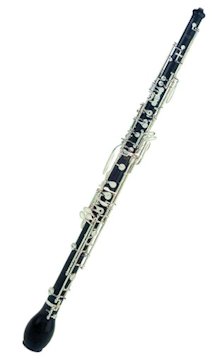
|
Misnomers in American English - 5
Type of Misnomer: A name retained based on a similarity The English horn is neither English in origin nor a horn. The term cor anglais is French for English horn, but the instrument is neither from England nor related to the (French) horn. The instrument originated in Silesia about 1720, when a bulb bell was fitted to a curved oboe da caccia-type body by the Weigel family of Breslau. The two-keyed, open-belled, straight tenor oboe (French taille de hautbois, "tenor oboe"), and more particularly the flare-belled oboe da caccia, resembled the horns played by angels in religious images of the Middle Ages. This gave rise in German-speaking central Europe to the Middle High German name engellisches Horn, meaning angelic horn. Because engellisch also meant English in the vernacular of the time, the "angelic horn" became the "English horn." Head cheese is actually a meat product. Head cheese or brawn is a cold cut that originated in Europe. A version pickled with vinegar is known as souse. Head cheese is not a cheese but a terrine or meat jelly made with flesh from the head of a calf or pig (sometimes a sheep or cow), and often set in aspic. A horned toad is actually a lizard. The horned lizard is popularly called a "horned toad", "horny toad", or "horned frog", but it is neither a toad nor a frog. The popular names come from the lizard's rounded body and blunt snout, which give it a decidedly toad- or frog-like appearance. Phrynosoma literally means "toad-bodied," and cornutum means "horned". The lizard's horns are extensions of its cranium and contain true bone. Catgut is made from sheep intestines. Catgut is a type of cord that is prepared from the natural fibre found in the walls of animal intestines. Usually sheep or goat intestines are used, but it is occasionally made from the intestines of cattle, hogs, horses, mules, or donkeys The word catgut may have been an abbreviation of the word "cattle gut". Alternatively, it may have derived by folk etymology from kitgut or kitstring - the word kit, meaning fiddle, having at some point been confused with the word kit for a young cat. |
| English Horn | |
| ⇦ Back to Misnomer 4 Return to Misnomer Choices On to Misnomer 6 | |